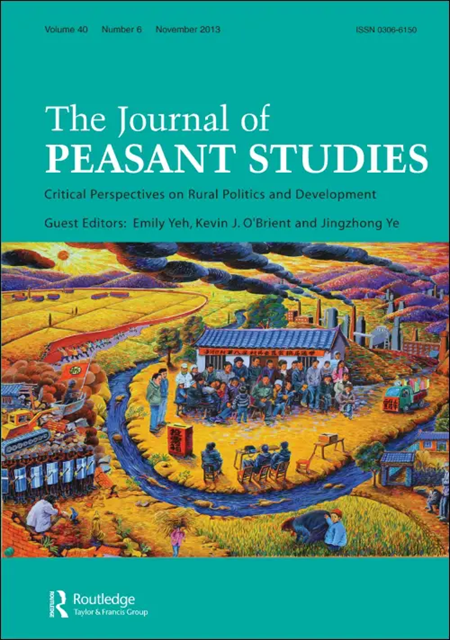网络,扎根和领土:恰帕斯州的绿色掠夺和抵抗
IF 4.4
1区 社会学
Q1 ANTHROPOLOGY
引用次数: 97
摘要
土地掠夺的特点是大规模的商业土地交易或大规模的自然保护区的绿色掠夺。在墨西哥的恰帕斯州,绿色掠夺采用了一种跨越国家、企业和民间社会的网络战略,以驱逐农民和土著社区,并促进采掘业、种植园和工业“生态旅游”的进入。抵抗植根于地方和民间社会组织和自治社区的联盟。网络实例和实地报告表明,一些环境组织在抢夺和/或抵抗网络中占据关键地位,与国家和企业利益有关的强大集团。阿瓜阿苏尔是一个规划中的大型旅游项目的关键节点,它的经验说明了网络和分散力量的部署,可以跨规模地拆除和重建领土。购买的小地块构成了生态旅游和考古遗址的遥远线路中的节点。实质上的抵抗同样具有根茎性,跨越森林和农业社区的群岛以及遥远的盟友,以重建自治领土。正在进行的土地斗争在网络空间中展开,整个领土和许多生命都处于危险之中。人权、土著、宗教和环保团体组成的新兴联盟承诺,将在恰帕斯和其他地方扩大对驱逐和占领绿色领土的抵制。本文章由计算机程序翻译,如有差异,请以英文原文为准。
Networked, rooted and territorial: green grabbing and resistance in Chiapas
Land grabbing has been characterized by large-scale commercial land deals or green grabs of large conservation tracts. In Chiapas, Mexico, green grabs employ a networked strategy across state, corporate and civil society lines to evict peasant and indigenous communities, and facilitate entry of extractive industries, plantations and industrial ‘ecotourism’. The resistance is rooted in place(s) and in a coalition of civil society organizations and autonomous communities. Network illustrations and field reports show that several environmental organizations occupy pivotal positions in grabbing and/or resistance networks, with large powerful groups linked to state and corporate interests. The experience in Agua Azul, a key node in a planned tourism megaproject, illustrates the deployment of networked and dispersed power to unmake and remake territories across scales. Small purchased plots form nodes in far-flung circuits of ecotourism and archeological sites. The substantial resistance is likewise rhizomatic in character, reaching across archipelagos of forest and farming communities and distant allies, to reconstitute autonomous territories. Ongoing land struggles play out in networked spaces, with entire territories, and many lives, at stake. Emerging coalitions of human rights, indigenous, religious and environmental groups promise an expanding resistance to evictions and territorial green grabs in Chiapas and elsewhere.
求助全文
通过发布文献求助,成功后即可免费获取论文全文。
去求助
来源期刊

Journal of Peasant Studies
Multiple-
CiteScore
10.50
自引率
17.60%
发文量
99
期刊介绍:
A leading journal in the field of rural politics and development, The Journal of Peasant Studies (JPS) provokes and promotes critical thinking about social structures, institutions, actors and processes of change in and in relation to the rural world. It fosters inquiry into how agrarian power relations between classes and other social groups are created, understood, contested and transformed. JPS pays special attention to questions of ‘agency’ of marginalized groups in agrarian societies, particularly their autonomy and capacity to interpret – and change – their conditions.
 求助内容:
求助内容: 应助结果提醒方式:
应助结果提醒方式:


